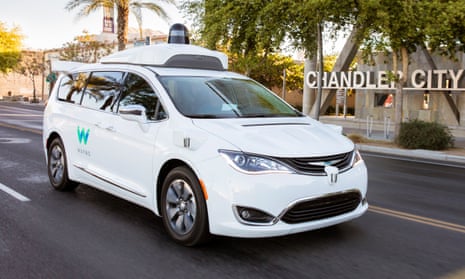Waymo, Google’s self-driving car sibling company, has acquired the Oxford artificial intelligence company Latent Logic for an undisclosed amount, giving Waymo its first presence in the UK.
Latent Logic, a spinout company from Oxford University, specialises in “imitation learning”, teaching machines how to act by showing them examples of humans doing the same actions. It was founded in 2017 by the academics Shimon Whiteson and João Messias.
Waymo hopes the company’s expertise can be put to use teaching AI drivers how to deal with complex behaviour such as a car cutting off another at a roundabout, a pedestrian emerging from a parked car, or a cyclist skidding in rain.
“The team’s expertise in reinforcement learning and imitation learning can help further accelerate Waymo’s progress in areas from simulation to behaviour prediction and planning,” the company said in a statement.
The Alphabet subsidiary is also intending to use its new base in Oxford to build a second pool of AI talent outside its headquarters in Mountain View, California. The UK is a world leader in AI research, including autonomous vehicles, and many talented researchers will not or cannot relocate to the US – no matter how deep the recruiter’s pockets.
Drago Anguelov, Waymo’s principal scientist and head of research, said: “We see an exciting opportunity in Europe, not only in continuing to build our partnerships with major automakers but also in benefitting from the world-class technology and engineering capabilities in Oxford and beyond.”
Whiteson, who will continue to work as a professor of computer science at Oxford, added: “By joining Waymo, we are taking a big leap towards realising our ambition of safe, self-driving vehicles. In just two years, we have made significant progress in using imitation learning to simulate real human behaviours on the road. I’m excited by what we can now achieve in combining this expertise with the talent, resources and progress Waymo have already made in self-driving technology.”
The acquisition is about research only, however: for the time being, Waymo has no plans to launch its self-driving taxis in the UK. Those remain strictly active only in Phoenix, Arizona, where they have recently begun to operate in a fully driverless manner, ferrying paying passengers around the city without even a human safety driver in the front seat.
The company does plan to operate in Europe in the near future, however, working with Renault to develop a self-driving taxi service for the 2024 Paris Olympics, when it hopes to be able to shuttle travellers from Charles de Gaulle airport to La Défense.









